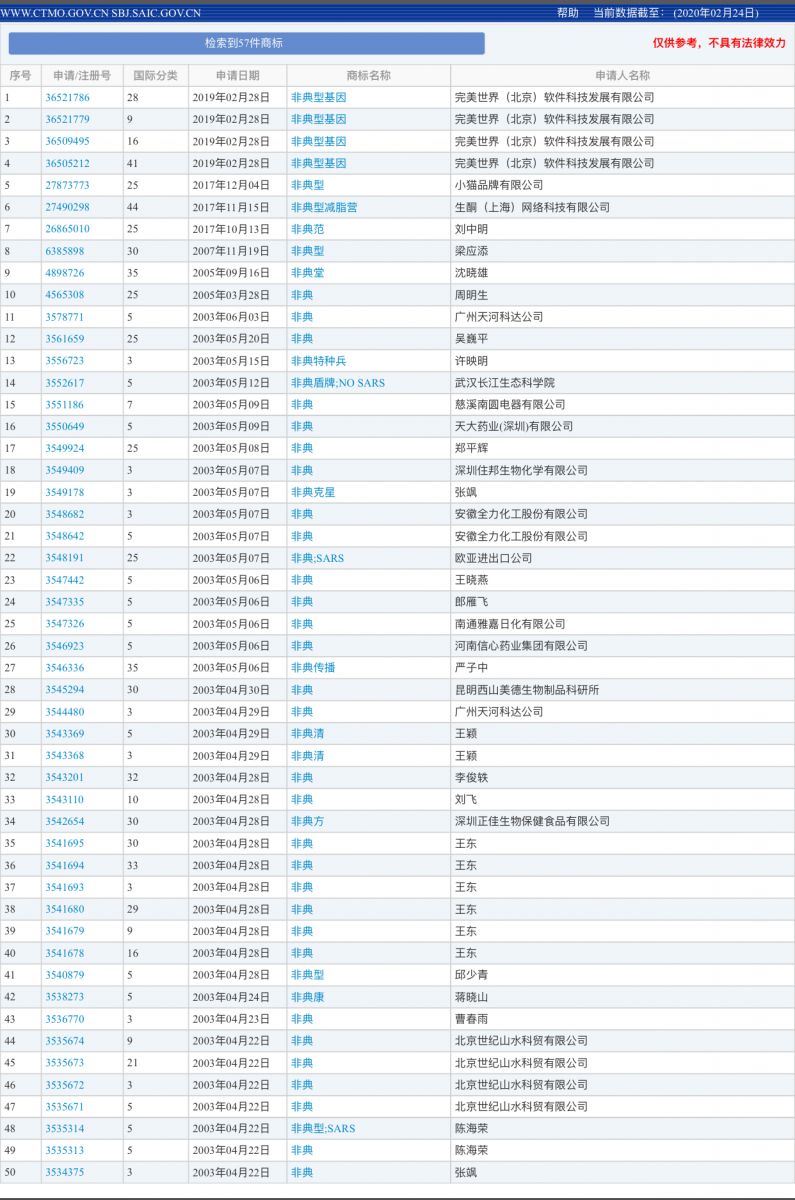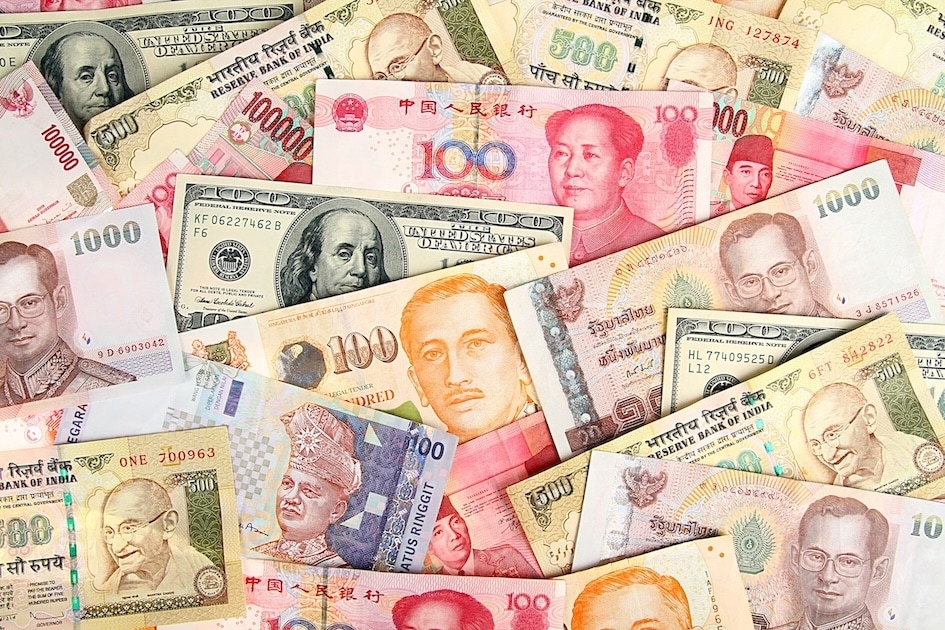Bad Faith Trademark Filling for Names related to the COVID-19 in China
26 Fév 2020
With the Amendments to the China Trade Mark Law, taking effect on 1 November 2019 and focusing on combating bad faith trademark filling and counterfeiters, we anticipate that maliciously pre-emptively trademark filling for names in connection with the 2019 Novel Coronavirus (now officially named as coronavirus disease (COVID-19) and severe acute respiratory syndrome coronavirus 2 (SARS-CoV-2) by World Health Organization (WHO) such as abbreviation/short names for the infectious diseases, names of hospitals and terms relating to the novel coronavirus would be refused for registration by the China National Intellectual Property Administration (“CNIPA”).
Bad faith trademark filling of 火神山 (pronounced “Huoshenshan”) and 雷神山 (pronounced “Leishenshan”)
As all may have known, to deal with and curb epidemic, China commissioned a new 1000-bed make-shift hospital in Wuhan, the epicenter for COVID-19 pandemic on 3 February 2020. The hospital was completed in a record span of ten days, named Huoshenshan hospital (Chinese火神山医院) serves as a quarantine hospital designated to treat patients infected with COVID-19 and will play an essential role in the ongoing battle against COVID-19, which attracted the world’s attention. In addition to this, a second field hospital, Leishenshan Hospital (Chinese 雷神山医院) has also commenced construction using the same model.
Surprisingly, there are some trademark applications for registration of these Chinese names of the above-mentioned two hospitals, i.e. 火神山 (screenshot 1) and 雷神山 (screenshot 2) filed on 3 February 2020 in the following classes:
Class 5 for pharmaceutical and medical products
Class 10 for surgical and medical apparatus and instruments
Class 32 for non-alcoholic beverages
Class 33 for alcoholic beverages
Class 35 for advertising; business management services
Class 43 for provision of temporary accommodation services
Bad faith trademark filling for the Chinese name “非典” (pronounced “Feidian”) aka SARS
Moreover, our search for the Chinese name “非典” (pronounced “Feidian”) aka SARS (Severe Acute Respiratory Syndrome – outbreak in 2003) on the PRC Trade Mark Register which showed around 57 applications for trademarks containing the Chinese name “非典” (SARS in Chinese) filed between 2003 to 2019 (Screenshot 3). Nevertheless, none of them were approved for registration.
Comments
In accordance with the amendments to Article 4 of China Trade Mark Law prohibiting bad faith trademark filling – “an application for trademark registration filed in bad faith without any intention to use of the trademark shall be rejected” and stipulation of Article 10(8) of the ChinaTrade Mark Law, signs that detrimental to socialist morality or customs or having any other adverse effect may not be used as trademarks, we envisage that these trademark applications for registration of the names of the two hospitals, i.e. 火神山 and 雷神山 will not be approved for registration, unless they were filed in the name of the local government authority or their authorized organization.
Article 10 of China Trade Mark Law stipulates that none of the following signs may be used as trademarks:
- Those identical with or similar to the State name, national flag, national emblem, national anthem, military flag, military emblem, military anthem, or decorations, among others, of the People’s Republic of China or those identical with the name or symbol of a central state organ, the name of specific place where it is located, or the name or design of its landmark building.
- Those identical with or similar to the State name, national flag, national emblem, or military flag, among others, of a foreign country, except as permitted by the government of the foreign country.
- Those identical with or similar to the name, flag, or emblem of an international intergovernmental organization, except as permitted by the organization or except that it will usually not mislead the public.
- Those identical with or similar to an official mark or an inspection stamp which indicates control or provides guarantee, except where authorized.
- Those identical with or similar to the name or symbol of the Red Cross or the Red Crescent.
- Those having ethnic discrimination.
- Those which are deceptive and likely to mislead the public in terms of the quality or origin of goods.
- Those detrimental to socialist morality or customs or having any other adverse effect.
The name of any administrative division at or above the county level or the name of any foreign place known by the public may not be used as a trademark, except that the place name has other meanings or is used as a part of a collective mark or certification mark. Existing registered trademarks containing place names shall continue to be valid.
Hence, the above-mentioned bad faith trademark filling would be disapproved for registration by the examiner on the absolute grounds of Articles 4 and 10 at the initial examination stage.
For more details of the above-mentioned bad faith filling and official names of the disease and virus, you may visit:
http://www.epbiao.com/shangbiaos/29062.html
Points to note for trade mark owners
While good faith traders will not file any trade mark in connection with COVID-19 or names of the hospital, they may encounter bad faith filers who file their trade mark before they do.
In view of the recent amendments of the China Trade Mark Laws on bad faith filing, trade mark owners may be able to rely on this ground to pursue relevant actions such as opposition, invalidation and infringement against bad faith filers. In particular, if there is clear and strong evidence showing that the bad faith filer has filed a certain amount of applications and has no real intention to use those trademarks and among which some trademarks belong to others or copies/imitations/translations of the rightful owners’ trademark, but purposely to take advantage of first to file system in China and ride on the rightful owner’s reputation and fame.
Should you have any trademark matters/questions pertaining to inherent registrability, usable availability or bad faith filers in China, please contact evelyne.yeung@oln-law.com or angel.luo@oln-law.com and we will be pleased to answer and assist.
Screenshot 1 showing applications for 火神山: Source from weibo.cn, one of the most popular online media in China
.jpg)
Screenshot 2 showing applications for 雷神山: Source from weibo.cn, one of the most popular online media in China
.jpg)
Screenshot 3: Source from CNIPA online Trade Mark Register

Author(s)
Recent News

 Suite 503, 5/F, St. George's Building, 2 Ice House Street, Central, Hong Kong
Suite 503, 5/F, St. George's Building, 2 Ice House Street, Central, Hong Kong +852 2868 0696
+852 2868 0696














